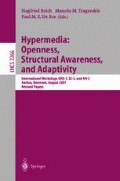Abstract
In this paper we present the architecture of an Adaptive Educational Hypermedia System, named INSPIRE. This particular system, throughout its interaction with the learner, dynamically generates lessons that gradually lead to the accomplishment of the learning goals selected by the learner. The lessons are generated according to the learner’s knowledge level, learning style and follow his/her progress. The adaptive behavior of the system, the functionality of the various modules and the opportunities offered to learners for intervention are presented.
Access this chapter
Tax calculation will be finalised at checkout
Purchases are for personal use only
Preview
Unable to display preview. Download preview PDF.
References
ARIADNE project. Available at http://ariadne.unil.ch.
Brusilovsky, P.: Adaptive and Intelligent Technologies for Web-based Education. In: Rollinger, C., Peylo, C. (eds.) Künstliche Intelligenz, Special Issue on Intelligent Systems and Teleteaching (1999)
Brusilovsky, P.: Methods and Techniques of Adaptive Hypermedia. Learner Modeling and Learner-Adapted Interaction, Vol. 6. Kluwer Academic Publ., Netherlands (1996)
Entwistle, N.J.: Styles of Learning and Teaching. David Fulton, London (1988)
Grigoriadou M., Papanikolaou K., Cotronis Y., Velentzas Ch., Filokyprou G.: Designing and Implementing a Web-based course. In: Proc. of Int. Conf. of Computer Based Learning In Science, Enschede, Netherlands (1999) H5
Groat, A., Musson, T.: Learning Styles: individualising computer-based learning envi-ronments. ALT-Journal 3 (2) (1995) 53–62
Hartley, R., Paiva, A., Self J.: Externalizing Learner Models. In: Greer, J. (ed.): Proc. of Int. Conf. on Artificial Intelligence in Education. AACE, Washington (1995) 509–516
Honey, P., Mumford, A.: The manual of Learning Styles. Peter Honey Maidenhead (1992)
Kolb, D. A.: Experiential learning. Englewood Cliffs, Prentice-Hall, NJ (1984)
Magoulas, G.D., Papanikolaou, K.A., Grigoriadou, M.: Neuro-fuzzy Synergism for Planning the Content in a Web-based Course. Informatica 25 (1) (2001) 39–48
Marcke, V.: A Generic Task Model for Instruction. Instructional models for Computer-based Learning Environments. Nato ASI Series F, Vol. 104. Springer-Verlag, Berlin Heidelberg New York (1992)
McLoughlin, C.: The implications of the research literature on learning styles for the design of instructional material. Australian J. of Educational Technology 15 (3) (1999)
Merril, M.D.: Component Display Theory. In: Reigeluth, C.M. (ed.): Instructional design theories and models: An overview of their current status. Lawrence Elrbaum Association, Hillsdale NJ (1983)
Papanikolaou, K.A., Grigoriadou, M., Kornilakis, H., Magoulas, G.D.: Towards New Forms of Knowledge Communication: An INtelligent System for Personalised Instruction in a Remote Environment (INSPIRE) (Submitted)
Papanikolaou, K.A., Magoulas, G.D., Grigoriadou, M.: A Connectionist Approach for Supporting Personalized Learning in a Web-based Learning Environment. In: Brusilovsky, P., Stock, O., Strapparava, C. (eds.): Adaptive Hypermedia and Adaptive Web-based Systems. Lecture Notes in Computer Science, Vol. 1892. Springer-Verlag, Berlin Heidel-berg New York (2000) 189–201
Stoyanov, S., Aroyo, L., Kommers, P.: Intelligent Agents Instructional Design Tools for a Hypermedia Design Course. In: Lajoie, S.P., Vivet, M. (eds.): Artificial Intelligence in Education. IOS Press (1999)
Vosniadou, S.: Towards a revised cognitive psychology for new advances in learning and instruction. Learning and Instruction 6(2) (1996) 95–109
Author information
Authors and Affiliations
Editor information
Editors and Affiliations
Rights and permissions
Copyright information
© 2002 Springer-Verlag Berlin Heidelberg
About this paper
Cite this paper
Papanikolaou, K.A., Grigoriadou, M., Kornilakis, H., Magoulas, G.D. (2002). INSPIRE: An INtelligent System for Personalized Instruction in a Remote Environment. In: Reich, S., Tzagarakis, M.M., De Bra, P.M.E. (eds) Hypermedia: Openness, Structural Awareness, and Adaptivity. AH 2001. Lecture Notes in Computer Science, vol 2266. Springer, Berlin, Heidelberg. https://doi.org/10.1007/3-540-45844-1_21
Download citation
DOI: https://doi.org/10.1007/3-540-45844-1_21
Published:
Publisher Name: Springer, Berlin, Heidelberg
Print ISBN: 978-3-540-43293-7
Online ISBN: 978-3-540-45844-9
eBook Packages: Springer Book Archive

